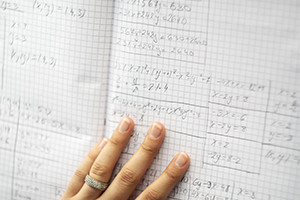This course delves into the traditional topics of a university-level linear algebra course. We begin the course by exploring the fundamental mathematical structures of linear algebra: the vector and the matrix. We follow this by explaining how to construct and solve systems of linear equations, which is one of the most basic applications of linear algebra. We teach how to calculate the inverse of a square matrix, if it exists, and calculate the determinant of a square matrix. To mathematicians, linear algebra is really about vector spaces and subspaces. We consider these important topics as well as how to find a basis for a vector space, determine if a transformation is linear using the conditions of linearity and produce the eigenvalues and eigenvectors of a square matrix. This course is designed to be more practical than theoretical. The instructor demonstrates step by step how to perform the calculations needed for each section.
Most people have never heard of linear algebra, yet it is believed to be one of the most important areas of mathematics. While it is customary for Mathematics and Engineering majors to take a linear algebra course, linear algebra is actually important in many fields. Linear algebra has many uses in Computer Science and, in general, is more important than calculus. These applications can range from image processing, robotics, computer graphics and machine learning. An important application in signal processing is Fourier Analysis, where a signal is decomposed into a sum of sinusoids. In the social sciences, a matrix can be used to represent a discrete dynamical system, for example population growth. In geology, a deformation matrix represents what happens to rocks under stress. In economics, an input-output model representing the relationship between sectors of the economy can be modelled using a system of equations.
An additional topic explored is the method of least squares'. There are many problems for which it may be difficult or impossible to provide an exact solution. In some cases, the least-squares method is a good way to find an approximate solution considered 'good enough’. The more someone studies Mathematics from an applied perspective, the more they are able to see problems that can ultimately be classified as solving a least-squares solution. It is vital to have a clear understanding of why you are doing what you are doing. Linear algebra is so practical to use in many areas of our daily lives and work spheres. Now that data science and machine learning have become so popular, linear algebra has spread beyond its typical audience. Anyone who wishes to work in computer vision, neural networks or data science will benefit from having a strong understanding of linear algebra.
What You Will Learn In This Free Course
View All Learning Outcomes View Less All Alison courses are free to enrol, study, and complete. To successfully complete this Certificate course and become an Alison Graduate, you need to achieve 80% or higher in each course assessment.
Once you have completed this Certificate course, you have the option to acquire an official Certificate, which is a great way to share your achievement with the world.
Your Alison certificate is:
- Ideal for sharing with potential employers.
- Great for your CV, professional social media profiles, and job applications.
- An indication of your commitment to continuously learn, upskill, and achieve high results.
- An incentive for you to continue empowering yourself through lifelong learning.
Alison offers 2 types of Certificate for completed Certificate courses:
- Digital Certificate: a downloadable Certificate in PDF format immediately available to you when you complete your purchase.
- Physical Certificate: a physical version of your officially branded and security-marked Certificate
All Certificate are available to purchase through the Alison Shop. For more information on purchasing Alison Certificate, please visit our FAQs. If you decide not to purchase your Alison Certificate, you can still demonstrate your achievement by sharing your Learner Record or Learner Achievement Verification, both of which are accessible from your Account Settings.











 Avg. Hours
Avg. Hours  Contains Video
Contains Video  CPD Accredited
CPD Accredited 
 Total XP:
Total XP: 
 Knowledge & Skills You Will Learn
Knowledge & Skills You Will Learn 







